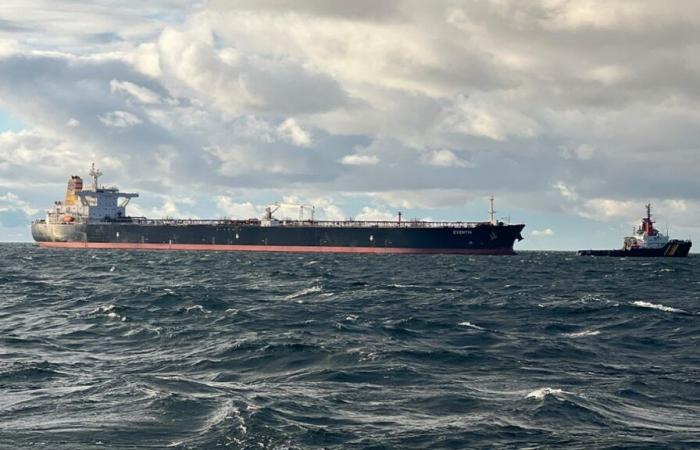Germany is trying to secure an oil tanker in distress in the Baltic Sea, accused of belonging to the “Russian ghost fleet”, to avoid an oil spill.
Germany is working on Saturday to secure a troubled oil tanker and avoid an oil spill in the Baltic Sea, a ship accused of being part of the “Russian ghost fleet”often dilapidated, through which Moscow exports its oil despite sanctions.
The Eventin tanker, with 99,000 tonnes of oil on board, is in a situation of “distress” and is out of engine power after a power outage during the night from Thursday to Friday, according to the German command center for maritime emergencies. The 274 m long vessel, flying the Panamanian flag, drifted for a time “at low speed, unable to maneuver, in the coastal waters of the Baltic Sea, north of Rügen”on the eastern German coast.
Three tugboats dispatched to the scene managed to establish a connection with the ship, which they are trying to move away from the coast by pushing it towards the northeast, the German naval authority said in a press release published on Friday night. to Saturday.
The command indicated that it had taken this “safety measure” because the wind, with a force of 5 to 6 on the Beaufort scale, has turned to the north and risks driving the ship towards the coast, among waves of“about 2.5 m high”. In its drift, the Eventin had approached 14 km from the tourist island of Rügen.
The targeted area, northeast of Cape Arkona, is “safer” because there is “more maritime space” which separates it from the coasts. It will take approximately eight hours for the ships to travel the approximately 25 km to the target area, which can be reached by mid-morning, the authority said.
To help with these tows, a German police helicopter hoisted four experts onto the Eventin who also brought radios and flashlights to the 24 crew members. “because the ship remains without electricity”. The four experts spent approximately three hours on the ship before being returned to shore.
In a previous update on the operation, the same source indicated that a German navy plane had not detected “no oil leak” by making several passes over the ship.
Dilapidated tankers
Foreign Minister Annalena Baerbock in a statement accused Russia of “endanger” European security “not only with its war of aggression against Ukraine (…) but also with dilapidated oil tankers”.
“By nefariously using a fleet of rusty tankers, (Vladimir) Putin is not only circumventing sanctions, but also putting up with the fact that tourism on the Baltic Sea is being shut down” in the event of an ecological disaster, she lamented.
According to Greenpeace, the Eventin, which was destined for Port Said in Egypt, had already been spotted for oil transport “particularly dangerous” and for his “technical defects”. It appears in the list of 192 “the most dangerous tankers” de l’ONG.
“Ships of the Russian Ghost Fleet threaten the coasts of the Baltic Sea every day”estimates Thilo Maack, marine biologist from Greenpeace cited by this organization.
Since the start of Russia’s invasion of Ukraine, the number of oil tankers with opaque ownership or without proper insurance has increased, allowing Russia to build a clandestine fleet to export its oil despite sanctions.
The United States and the United Kingdom announced new sanctions on Friday against the Russian energy sector, which notably target nearly 200 oil tankers and LNG tankers operating from Russia and presented as being part of this “ghost fleet”. The EU has already sanctioned nearly 80 ships.
Following the damage to two oil tankers, victims of a shipwreck in mid-December between Russia and Crimea, Moscow is also facing massive oil pollution in the Black Sea. Russian authorities announced on Friday that they had detected a new fuel oil leak in one of the two tankers concerned.
tanker baltic sea oil russia Russian ghost fleet







